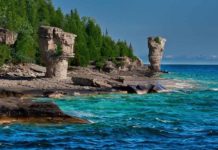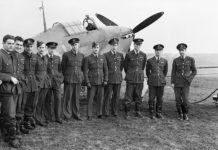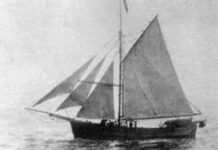A wilderness of forests, rocky regions and waterways, Upper Canada was sparsely populated in the early to mid-1800s. Those who came to southern Ontario were looking for a fresh start, hoping through hard work to build good lives for themselves and their families. The Church of England was also making a fresh start in the region with the new Upper Canada Clergy Society. A pioneer missionary was needed, and Featherstone Lake Osler was the prime man for the job.
Church of England Ordination in 1837
Initially a member of the Royal Navy in England, Osler made a career change when he was about age 27. He decided to become a clergyman with the Church of England, studying at Cambridge. Receiving a BA degree in 1837, Osler was ordained deacon the same year and in short time, he was ordained priest. “His first thought had been of a comfortable living in England, and it was with some reluctance that he accepted appointment to Tecumseth and West Gwillimbury townships,” said John Webster Grant in the entry, “Osler, Featherstone Lake” in Dictionary Canadian of Biography Online. Osler packed up his wife, Ellen Free Picton, and family, and sailed for Canada. (The Osler family would eventually include three daughters and six sons.)
A Saddlebag Preacher in Upper Canada
Giving his posting his best effort, Osler dove into launching the Anglican community in Upper Canada. Establishing his own parish, he also built the family home in the village of Bond Head, 40 miles north of the southwestern edge of Lake Ontario. Osler galloped throughout the territory holding services and encouraging the raising of churches. Visiting distant settlements and parishes on horseback and braving the capricious weather of the four seasons, Osler was known as a “saddlebag preacher,” a designation most often given to the Methodist ministers in Upper Canada. To enhance his important mission, Osler opened a school to train “Bush Clergymen” in the skills required for pioneer religious duties. While hard at work, Osler continued to further his theological education, earning a Master’s Degree in 1843.
Osler Unhappy with Bishop Strachan
The travelling missionary created a solid footing for the Church in southern Ontario, but Osler was not always happy with his superiors. Considering Bishop John Strachan unsupportive, Osler was frustrated when Strachan sent a number of the “Bush Clergymen” graduates to preach elsewhere. “On several occasions,” noted Grant, Osler “hinted at a possible return to England, but he relented when relieved of West Gwillimbury in 1851.” Six years later, Osler was named Rector of Ancaster and Dundas.
Bibles and Tracts Distributed by Osler
A devout man of strict values, Osler was genial and friendly with an open heart to the welfare of others. But occasionally, the minister was considered arrogant and hard-edged. If a dying person could not make a believable claim of faith, Osler refused them the sacraments. Resolute that the Church would be well-administered, Osler made certain there was little debt and good amenities. Twenty years after his arrival in Canada, Osler was “claimed to have begun 28 congregations and as many Sunday schools,” Grant said. He distributed bibles and religious tracts, and his wife’s uncle, Henry Bath, forwarded money from England in 1838 toward the purchase of bibles for the benefit of Osler’s rural congregations.
Osler Sons Became Prominent Professionals
The children of Ellen and Featherstone Osler thrived under their parents’ positive attitudes toward higher education. Three of the Osler sons were prominent in Canadian history: Britton Bath Osler was a highly-respected lawyer and Crown Prosecutor, Edmund Boyd Osler was a politician and bank president, and William Osler grew to become a renowned Canadian physician who initiated the modern “bedside medicine.”
Retiring to Toronto in 1882, Osler was named Canon of the Christ’s Church Cathedral in Hamilton, Ontario. The devoted “saddlebag preacher” participated in the growth of the Church of England, watching as Canada transformed from wilderness and farmland to urban cities. He left a legacy of faithful Anglican congregations, and a family of capable, intelligent members who would continue to strengthen the country in their own right. Featherstone Lake Osler died on February 16, 1895 at 89 years of age.







